If your dog is vomiting, dealing with diarrhea, or just seems restless and uncomfortable after meals, it can be worrying as a pet parent. Upset stomachs are among the most common digestive problems in dogs, and while they often look alarming, many cases can be managed safely at home.
The best part? You don’t always need medication—sometimes, simple dietary changes and gentle home remedies are enough to bring your pup quick relief.
In this vet-approved guide, we’ll show you how to calm a dog’s upset stomach naturally, which safe foods and remedies can ease symptoms like gas, bloating, or loose stools, and the red-flag signs that mean it’s time to see your veterinarian. By the end, you’ll feel confident knowing exactly what to do when your dog’s tummy troubles strike.
This vet-approved guide was reviewed and updated in January 2026 to reflect current recommendations for managing mild digestive issues in dogs.

Common Signs of an Upset Stomach in Dogs
Dogs can’t tell us in words when they feel sick, but their body language and behavior often give clear warning signs. If you’re wondering whether your pup has tummy troubles, here are the most common symptoms to watch for:
- Vomiting 🤢 – throwing up food, bile, or foam. Occasional vomiting may not be serious, but repeated episodes mean something’s wrong.
- Diarrhea 💩 – loose or watery stools are a classic sign of digestive upset. If it lasts more than a day, dehydration can become a risk.
- Loss of appetite 🍲 – refusing meals or even favorite treats is a red flag that your dog’s stomach isn’t feeling right.
- Gas or bloating 💨 – excessive flatulence, stomach noises, or discomfort when lying down can point to indigestion.
- Eating grass 🌱 – many dogs instinctively chew grass to relieve nausea, but frequent grass-eating may indicate stomach irritation.
👉 If these symptoms appear, it’s important to know how to calm a dog’s upset stomach naturally with safe remedies—or seek veterinary care if they persist.
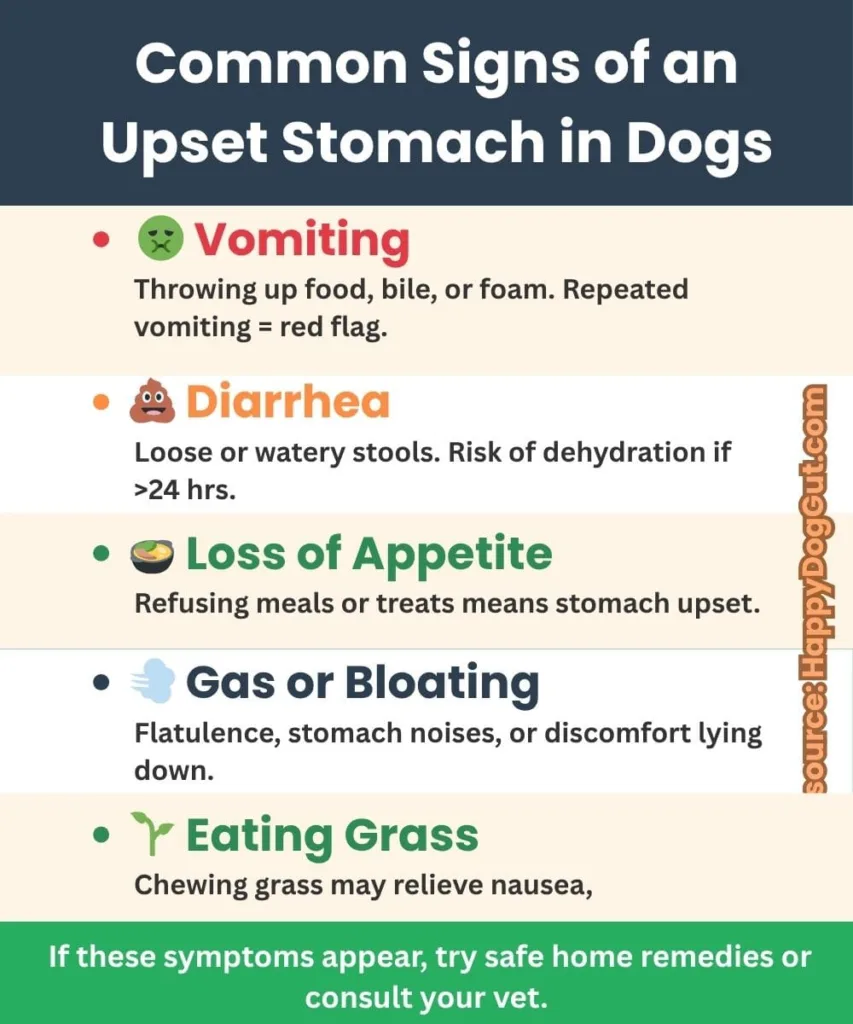
How to Calm a Dog’s Upset Stomach Naturally
If your pup is vomiting, has diarrhea, or just seems uncomfortable, you don’t always have to rush to medications. Several safe, vet-approved home remedies for dog upset stomachs can help soothe their tummy naturally.
1. Fasting for a Short Period ⏳
Giving your dog’s digestive system a rest is often the first step. Skipping food for 12–24 hours (only 6–8 hours for puppies) allows the stomach to settle. This simple pause can stop vomiting and give the gut a chance to reset before reintroducing food.
2. Bland Diet (Boiled Chicken & Rice) 🍗
A bland diet for dogs with upset stomachs is one of the oldest and most effective remedies. Boiled, skinless chicken mixed with plain white rice is easy to digest, provides protein and carbs, and helps firm up stools. If your dog has diarrhea, our Homemade Chicken & Rice for Dogs with Diarrhea Guide explains the exact recipe and feeding schedule recommended by vets.
If your dog frequently struggles with digestive issues, you may also try homemade dog food for sensitive stomachs that is balanced, nutritious, and gentle on the gut.
3. Pumpkin for Digestive Relief 🎃
Pumpkin is a superfood for digestion. It’s soluble fiber absorbs excess water in diarrhea and adds bulk to ease constipation. Always use plain canned pumpkin or freshly cooked pumpkin (never pumpkin pie filling with sugar or spices).
For more detailed guidance, check out our full guide on pumpkin for dogs with sensitive stomachs and learn how much to feed safely.
4. Probiotics & Yogurt (Vet-Approved) 🥛
Restoring healthy gut bacteria is key when your dog has tummy issues. Probiotics for dogs improve digestion and strengthen immunity. You can use a vet-recommended probiotic supplement, or offer plain, unsweetened yogurt with live cultures in small amounts—if your dog tolerates dairy.
Many pet parents also prefer using specially formulated dog probiotics for sensitive stomachs to ensure better digestion and immunity support
5. Hydration with Electrolytes 💧
Dehydration is a serious risk when dogs have diarrhea or vomiting. Keep fresh, clean water available at all times. For extra support, your vet may recommend an unflavored electrolyte solution (like Pedialyte for dogs) to replace lost fluids and minerals.
6. Slippery Elm or Herbal Remedies 🌿
Some holistic veterinarians suggest slippery elm bark powder mixed with water as a natural stomach soother. It coats and protects the digestive tract. However, always consult your vet before trying herbal remedies for your dog’s upset stomach, especially if your pet is on other medications.
👉 These natural remedies are safe for mild cases, but if symptoms last more than 24–48 hours, or your dog shows signs of severe illness (blood in stool, lethargy, constant vomiting), it’s time to call the vet.
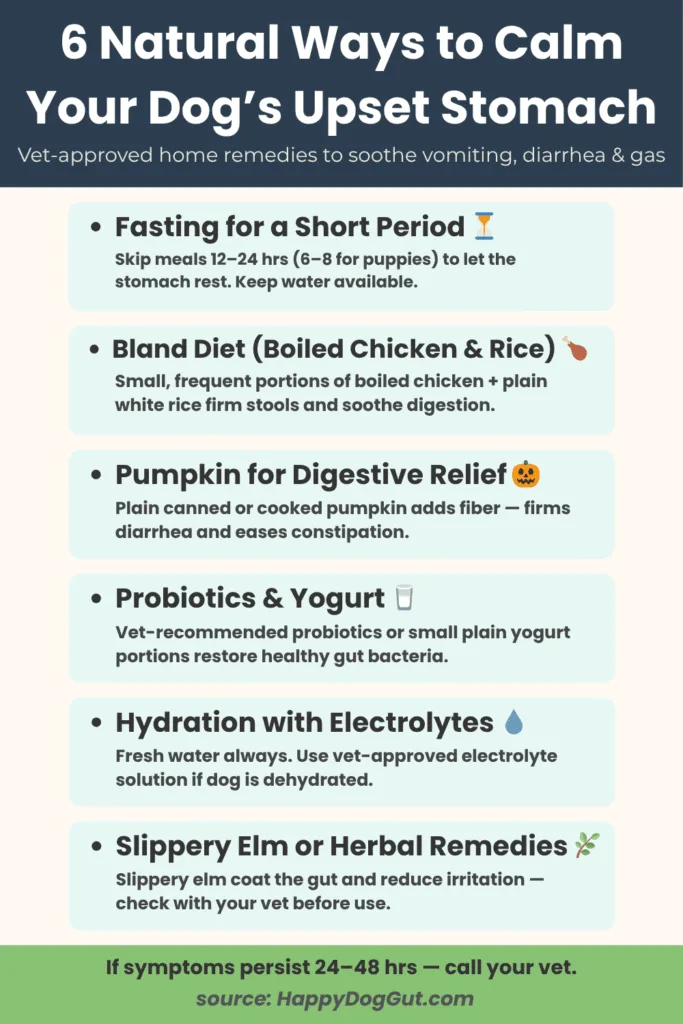
Foods That Can Help Soothe an Upset Dog Stomach
When your dog has tummy troubles, the right foods can make all the difference. Gentle, easy-to-digest foods not only provide relief but also support recovery. Here are some of the best natural options:
🍗 Plain Boiled Chicken
Lean protein like boiled, skinless chicken is light on the stomach and provides essential nutrients without adding extra fat. It’s a staple in the bland diet for dogs with diarrhea or vomiting.
🍚 White Rice
Soft, plain white rice is bland and low in fiber, making it one of the best foods for calming a dog’s upset stomach naturally. It helps firm up stools and is easy to mix with chicken for a simple recovery meal.
🎃 Plain Pumpkin
Pumpkin is a fiber powerhouse—it absorbs excess liquid to stop diarrhea and adds moisture to ease constipation. Always use plain canned pumpkin or fresh cooked pumpkin, never sweetened pie filling.
🥣 Bone Broth
Warm, unsalted bone broth is both hydrating and nourishing. It provides minerals and amino acids while encouraging picky or sick dogs to eat again. Plus, it’s gentle on sensitive stomachs.
🥛 Probiotic Yogurt
Plain, unsweetened yogurt with live cultures helps restore healthy gut bacteria. Probiotics for dogs can reduce bloating, gas, and stomach upset. Only use in small amounts, and avoid if your pup is lactose intolerant.
👉 These are the best natural foods for a dog with an upset stomach—safe, soothing, and vet-recommended. Keep them on hand so you’re prepared whenever tummy troubles strike.
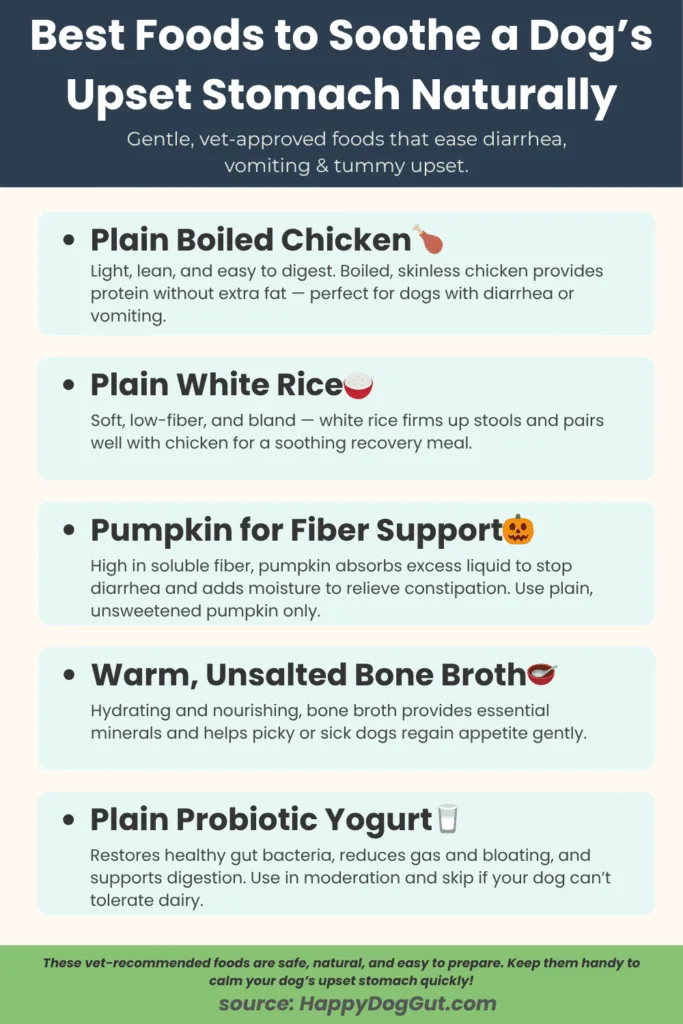
When to See a Vet
While learning how to calm a dog’s upset stomach naturally is useful, it’s just as important to know when home remedies are not enough. Some symptoms point to a more serious condition that requires veterinary attention. Call your vet immediately if you notice:
- Diarrhea or vomiting lasting more than 24–48 hours ⏳ – prolonged tummy issues can quickly lead to dehydration.
- Blood in vomit or stool 🩸 – even small streaks of blood may indicate infection, ulcers, or other serious problems.
- Severe dehydration signs 💧 – such as sunken eyes, dry or sticky gums, and extreme lethargy.
- Puppies or senior dogs are affected 🐶👵 – younger and older dogs dehydrate faster and are at higher risk of complications.
- Loss of appetite for more than a day 🍲 – skipping one meal is common, but ongoing refusal to eat signals a problem.
- Severe abdominal pain or bloating 💨 – pacing, whining, or an enlarged belly could mean something urgent like bloat.
👉 Key Takeaway: Never rely only on home remedies if your dog’s symptoms worsen or persist. A vet exam ensures the upset stomach isn’t caused by something more serious, such as infections, parasites, or underlying health conditions.
The U.S. Food and Drug Administration notes that prolonged gastrointestinal symptoms in pets, including diarrhea, vomiting, or refusal to eat, may signal underlying health issues and should be assessed by a licensed veterinarian.
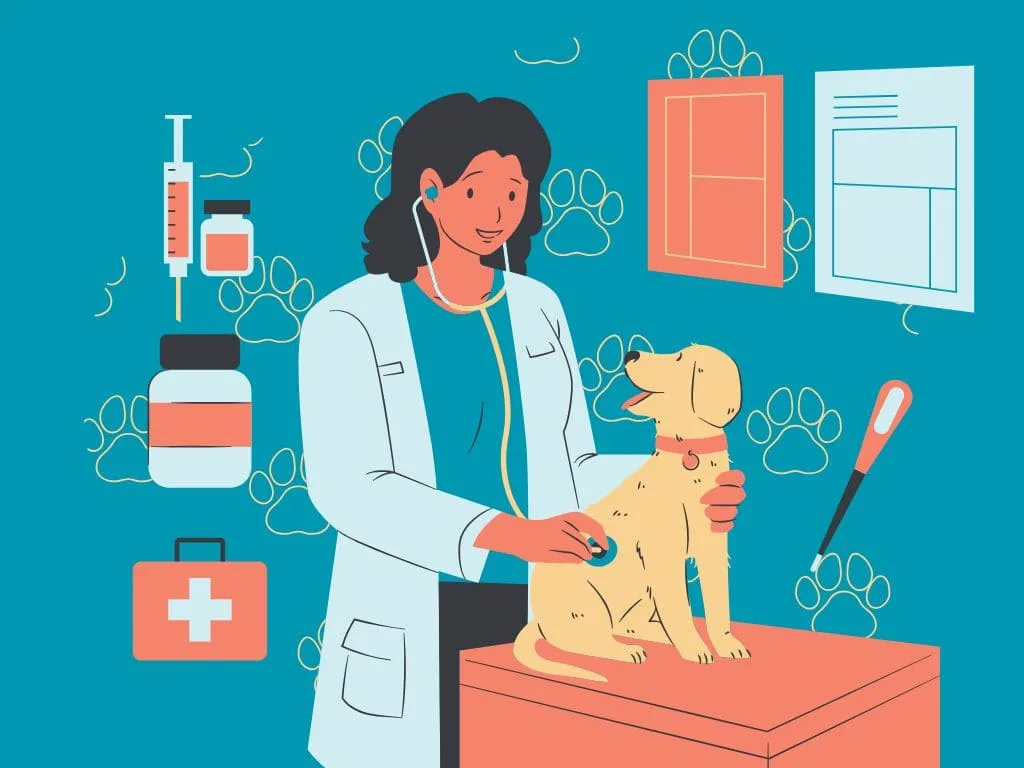
Preventing Upset Stomach in Dogs
When it comes to digestive health, prevention is always better than a cure. While knowing how to calm a dog’s upset stomach naturally is helpful, the best approach is to reduce the chances of stomach problems in the first place. Here are some vet-approved prevention tips:
- Transition foods slowly – Always switch your dog’s food gradually over 9–11 days by mixing the new food with the old one. Sudden changes in diet often trigger diarrhea, gas, or vomiting. For step-by-step instructions, check out our Dog Food Transition Guide for vet-approved tips on how to switch dog food without stomach upset.
- Avoid table scraps and fatty foods – Human foods such as fried items, spicy dishes, or leftovers are too rich for dogs and can easily upset their stomachs. Stick to a consistent, dog-safe diet.
- Choose sensitive stomach dog foods – Specially formulated dog foods are designed for gentle digestion and often contain prebiotics, probiotics, and easily digestible proteins. There are several best dog foods for sensitive stomachs that are specially designed to reduce digestive problems while supporting overall health.
- Keep probiotics in their diet – Adding dog-friendly probiotics (either supplements or natural sources like plain yogurt) helps maintain healthy gut bacteria, which supports digestion and immunity.
- Maintain a consistent feeding schedule – Feeding your dog at the same times every day reduces stress on their digestive system and prevents overeating or hunger-related stomach upset.
👉 Key takeaway: A balanced diet, digestive supplements like probiotics, and gradual food transitions can significantly reduce the chances of tummy issues. By focusing on prevention, you’ll need fewer home remedies later to calm your dog’s stomach naturally.
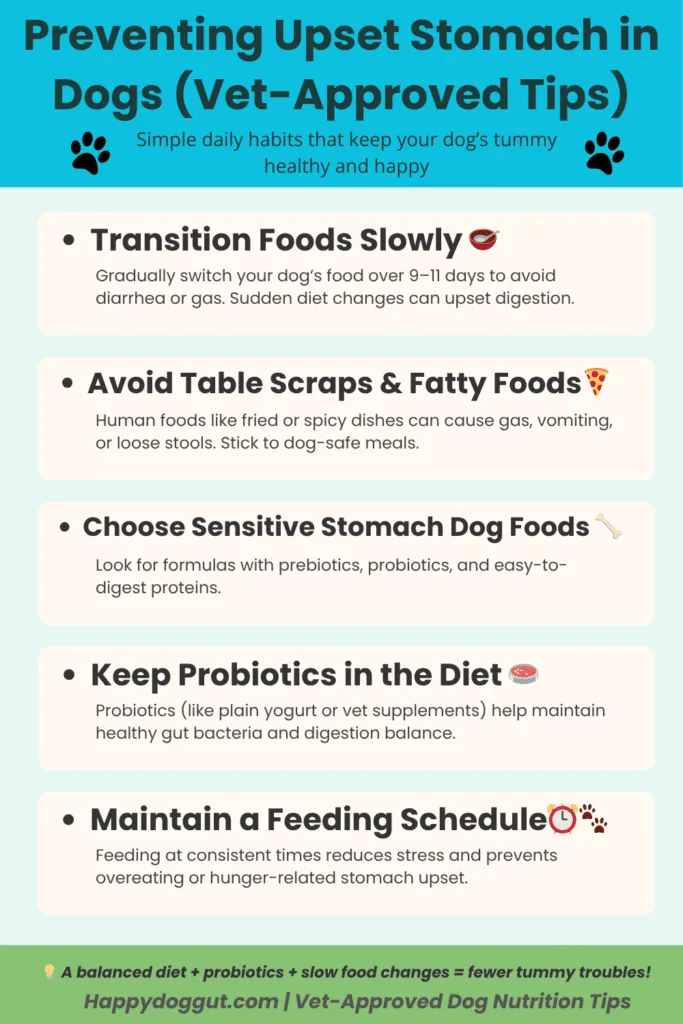
FAQs About Calming a Dog’s Upset Stomach Naturally
What can I give my dog naturally for an upset stomach?
You can safely give your dog plain pumpkin, boiled chicken with rice, bone broth, or probiotics as natural remedies. These ingredients are easy to digest and help soothe gut irritation. Many pet parents ask how to calm a dog’s upset stomach naturally, and these gentle foods are a good starting point.
Can rice calm a dog’s upset stomach?
Yes. Plain white rice is bland, low in fiber, and easy on the stomach. When combined with boiled chicken, it becomes a balanced, bland diet that can help firm loose stools and reduce digestive stress.
Is pumpkin safe for dogs with diarrhea?
Absolutely. Pumpkin is one of the best natural remedies for dog diarrhea. Its soluble fiber absorbs excess water from the intestines, helping to firm up stools. Just make sure to use plain, unsweetened pumpkin (not pie filling).
How long does it take for a dog’s stomach to settle?
For mild cases, stomach issues may improve within 24–48 hours when you use home remedies like pumpkin or a bland diet. However, if diarrhea or vomiting lasts longer, or your dog shows other symptoms, consult a vet right away.
Can I give yogurt to my dog for an upset stomach?
Yes, but only plain, unsweetened yogurt with live probiotics. Yogurt helps restore healthy gut bacteria, which supports digestion. However, since some dogs are lactose intolerant, introduce it slowly in very small amounts.
Should I let my dog eat grass when their stomach is upset?
Dogs often eat grass when they feel nauseous, but it can sometimes make things worse by irritating the stomach lining. Instead of letting them overeat grass, offer safe home remedies like pumpkin, bone broth, or boiled chicken with rice.
What if my puppy has an upset stomach?
Puppies are more vulnerable because they dehydrate quickly. If your puppy shows diarrhea, vomiting, or refuses food, offer small amounts of bland meals (rice + chicken). If symptoms don’t improve within 12–24 hours, call your vet immediately.
When should I worry about my dog’s stomach issues?
You should seek vet care if your dog is lethargic, refuses food for more than a day, vomits repeatedly, or shows blood in stool/vomit. These could be signs of something more serious than a simple upset stomach.
Final Thoughts
Knowing how to calm a dog’s upset stomach naturally can save your pet from discomfort and reduce unnecessary vet visits. Mild symptoms often respond well to pumpkin, chicken, and rice, probiotics, and hydration. But remember—if issues last beyond 1–2 days or symptoms worsen, always consult your veterinarian.

If you’re confused about diet choices, here’s a breakdown of grain-free vs grain-inclusive dog food for sensitive stomachs to help you make the best decision.
👉 Want more vet-approved guides? Check out our post on Best Puppy Foods for Sensitive Stomachs.
Hi, I’m Maddy, the writer behind HappyDogGut.com.
I’m passionate about helping Dog parents understand Gut Health, Sensitive Stomachs, and Natural Nutrition for dogs.
Every article I create is vet-approved, research-backed, and experience-driven, so your pup can enjoy a healthier, happier gut.
Happy Gut = Happy Dog!
All content on Happy Dog Gut follows our Editorial Policy.






Pingback: How Long Does a Dog’s Upset Stomach Last? Timeline & When to Worry